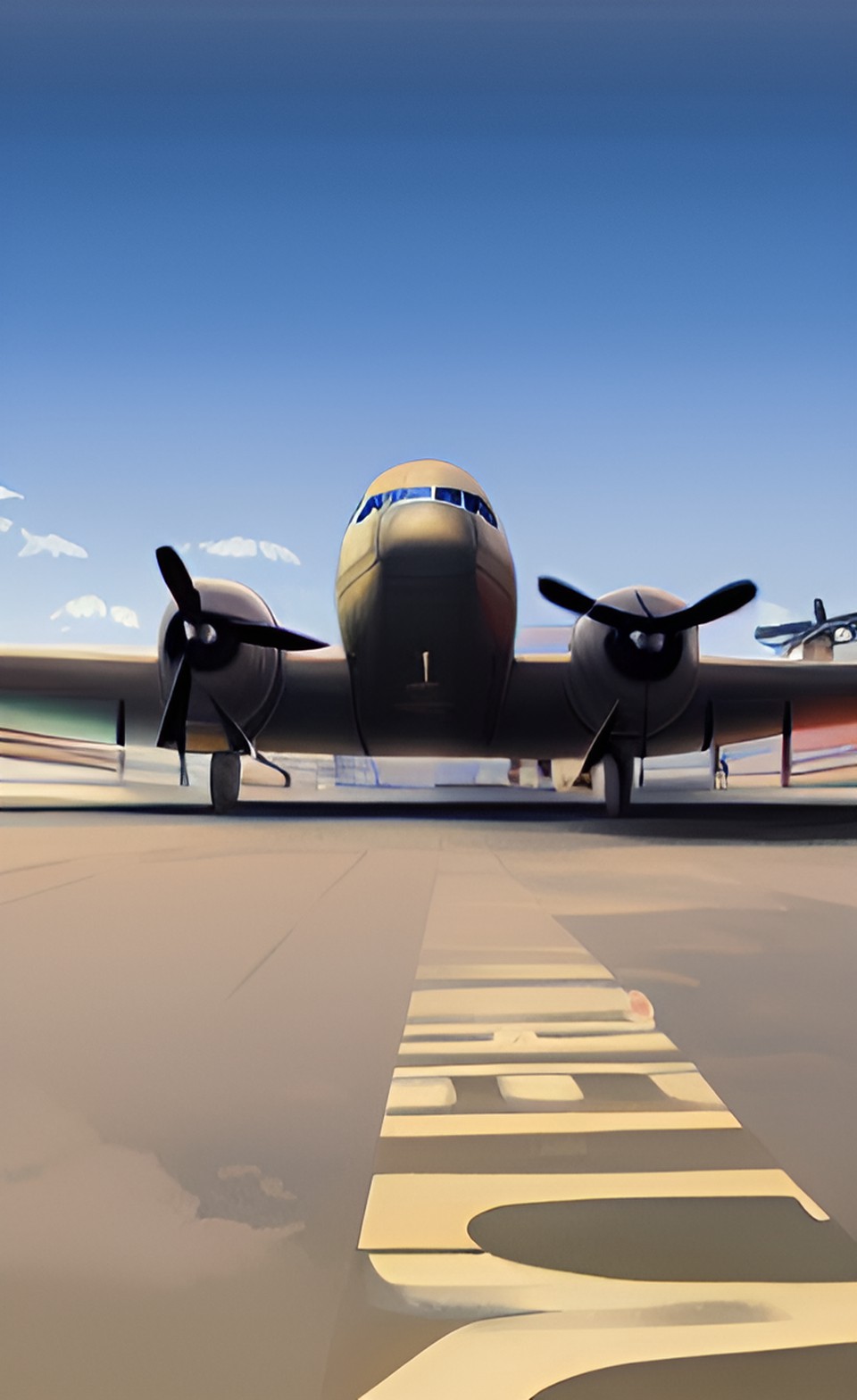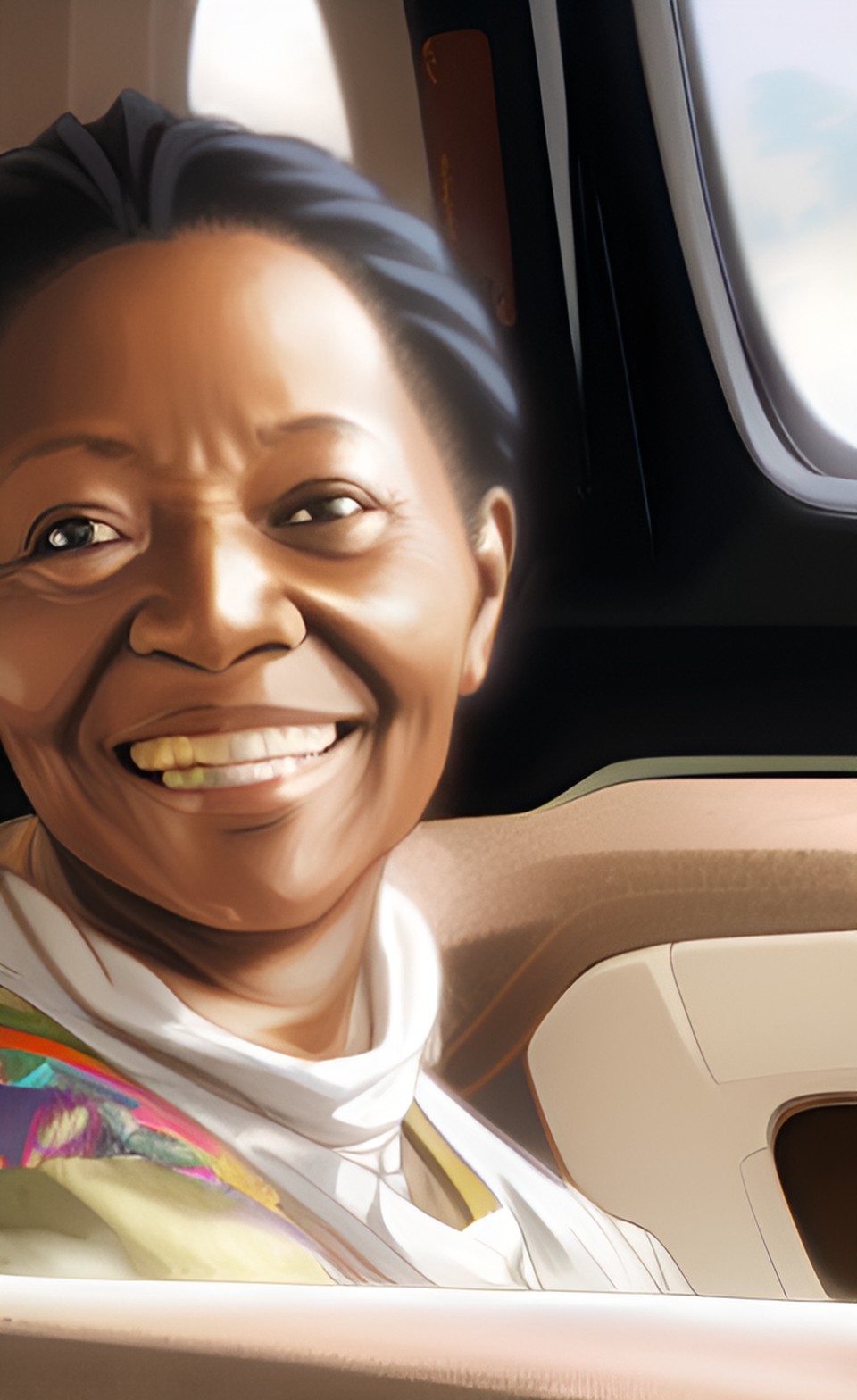Gorilla Republic: Mapacha: Mughamarat f'almaghrib: Part 5
FEB 10, 2023

"Roger! 7 — Tango — Golf — Romeo — Romeo, taxi to 3-1 and hold!" the tinny voice squeaked through the headset.
The ambient temperature in the cabin approached 30 degrees. The heat made them desperate to take off, but the controller held them back. Mapacha, next to Gwafa concentrated on the radio exchange, as he continued his lesson on the International Civil Aviation Organization procedures. In the back, amidst the diplomatic bags and sealed boxes, Banou was uncomfortably perched on the canvas military seat, as she fanned herself with her straw wand fan while Mzee Tembo, comfortable in his element dozed off.
"Roger!" Gwafa shot back at the controller.
Mzee Tembo roused himself. "What is the hold-up Gwafa?"
"Awaiting clearance boss. There is a delayed plane that is about to land, so we need to wait for a moment, till it clears the runway."
Almost instantly, a Florença Airlines Convair Coronado, liveried in dust and green hues touched down. Its wheels squeaked as they made contact with the fiery tarmac and left conical trails of bluish smoke that spiralled rapidly as the engines and wings gusted a light brown mist of dust. They heard the scream of the General Electric turbofans pitch up in reverse to slow it down. Banou watched through the tiny square porthole from the interior of the Skytrain at what was. Those memories that she had fought to bury flooded back, but all she could do was gaze at the glamour of a life that was, huddled in the tiny canvas chair that had been designed for military bottoms.
The pitch of the Hamilton Standards changed as the Wasps propelled them with more power and the plane began its run. At first, it was a slow lumber-like motion but then it gathered speed and left a trail of sand in its wake as it accelerated. It bounced for a moment and finally soared. This was the moment Mapacha enjoyed. Once the plane began its ascent, the cabin temperature slowly dropped and became more tolerable. They heard the thump of the wheels as the gear locked in place. Gwafa received his instructions from the controller, adjusted his course and relayed his position. The journey to Morocco had begun.
Mzee Tembo was elated to be up in the air, thrilled by the promise of the adventure ahead and grateful for the short break from Una. Their morning intercourse over his favourite breakfast had been far too blasé for his own ease. Una had solely implored him to remember her while he was abroad, a not-so-subtle hint to bring her Moroccan fabric. Unbeknownst to him, her indifference was not out of scorn or jealousy or even marital neglect. This was far from it.
Una was in the middle of a character development crash course of her own. With her new responsibilities, there was a need to perfect her competence in how she wielded soft power amongst her peers. The days of being held hostage for the sake of conciliation were far behind her. In the various secret societies of ladies' groups that she belonged to, there was a perpetual jostle for dominance and the one who trailblazed and excelled in business or fashion, or even family success was the de facto 'empress'. There were no elections. It was not even discussed among the women, but the most sought-after lady would host afternoon teas, prayer sessions and generally proposed and led functions. Una had been a passenger on that bus for far too long. She followed and lived vicariously, but now, with a minor role as a manager of a small bicycle shop, her faint star had begun to dazzle.
Her qualifications were just right. She was married to a former military man who had risen to the rank of Tenente-general. Despite being retired he was respectfully saluted by pretty much every uniformed officer on the island. He had then gone on to reinvent himself as a successful businessman. There were no known mistresses in his orbit and he had wisely sent their children abroad where it was generally assumed they excelled in their affairs. His success was now amplified by his monthly travel abroad for business, while other women's husbands could only agonise about fish or chicken once or twice a year and even then, the furthest they ventured was to Dakar or Accra. Such was the illusion.

She was chauffeured to 'their' business, albeit in a taxi whereas the other women who were privileged enough to operate an establishment or perhaps were employed had to endure a round trip in the muggy public minibuses or ancient Bedford buses that crawled around the city. And she presented herself in the finest dresses cut from imported fabric and tailored by the magical fingers of one of the reputed stars of ladies' wear, while the others donned poorly cut designs assembled from inferior quality knockoffs from India or China that run and faded on their very first wash. For those that claimed original fabric, they were the regularly imported kentes from Ghana that were on a perpetual 'buy one get one free' promotion.
Her next hurdle, one she would toil to find the words to voice to her husband to make him comprehend, was important for her and was indeed a monumental leap. She wanted to learn how to drive, and this meant she could not rock their matrimonial boat. So blasé, it had to be. She knew her place. Despite now having some money, she knew it would reflect poorly on her and her husband if she sought lessons discreetly, so, the hurdle had to be vaulted when Mzee Tembo returned from Morocco armed with the fabric she so desired. Her resolution at this point was indestructible.
Above the gleam of the bright blue waters of the Atlantic, between the puffy white clouds, was where Mapacha's heart truly lay. He was captivated. Such an indescribable view. He was unintimidated by the several instruments that kept the Skytrain airborne. They occasionally passed over a tiny dot, a boat or ship, and Mapacha smiled inwardly, as he tried to imagine the bore of a slow boat to another island or the mainland. The gentle throb of the plane finally lulled Mzee Tembo into a deep slumber. Banou, opposite him, unfastened her black train case and rummaged through the library of magazines in search of a new decor one she had picked at the airport newsstand to add to her collection and she began to peruse it, as she planned for her spree in Morocco.
When the plane peaked, Gwafa set the Sperry autopilot on, sat back and got caught up in an animated conversation with Mapacha. Here they were, two wild brothers, at the helm of a Skytrain off to commit some criminalities aboard. Six hours later, a tiny shard of light glinted just over the horizon. A short while later, they sighted the dust-covered island that pierced out of the aquamarine waters. The Skytrain hinged left over Punta de Gando, then left again over the bay and craftily skimmed the edge of the island. The tower appeared on their right and in its shadow the long runway they were to land on. Gwafa turned right twice again over Playa de Vargas, relayed his position, received his instructions, and corrected his course as they flew over Las Rojas Viejas in a slow descent. His last right turn over Las Palmillas lined him up for the runway and he lowered the gear. The plane gracefully rumbled towards the tarmac and rattled as it touch down. The bump and squeak of the tired jolted Mzee Tembo from his deep slumber.
"Where are we?"
He was momentarily dazed.
"Gran Canaria. Refuelling stop."
The plane's engines whipped up a storm of dust as it taxied down the runway. From the square porthole, Banou's face was full of dismay at the desolation of the minuscule island. This was no Ilha de Florença. To her, it was a tiny arid rock that had partway lost its battle with the ocean. The Aeropuerto de Gran Canaria was a critical asset for the island and with its construction works in full swing, it impressed her. Its new passenger terminal would definitely be fancier.
"This place looks busy," she heard Mapacha quip.
And it was. It may have been a distant child of Spain, but even that did not deter from its interminable round-the-year draw of tourists from round the globe, and admirably had one of the busiest airports in the entire empire of Spain. Its perpetually agreeable weather made it ideal for venturesome Europeans and North Americans who had fled the inhospitable winters.
When the spin of the propellers finally ceased, the wheels of the plane were choked, and this allowed Gwafa to unlock the service door and hop out. Mapacha sidled round the cargo to get get to the rear passenger door. The rest followed him and climbed down the narrow foldable steps.
"Gwafa?" Mzee Tembo's pressed look said it all.
"Right there boss." He pointed to the terminal where the facilities were. The three left Gwafa and headed into the building.
Gwafa watched as an odd and boxy red Cepsa Fiat 690 hydrant cart emerged from the service station of the airport. When it stopped in front of the Skytrain, a wrinkled sunburnt Spaniard in red overalls immediately sprung out of the driver's door and greeted him. The Spaniard manhandled a ladder from the side of the truck and propped it in front of the front right wing of the plane. Gwafa mounted it and released the fuel cap. The Spaniard handed him the tip of the hose that he coupled to the plane. He clambered down and watched him as he pumped the high-octane aromatic into the near-empty tanks. Mapacha was the first one back and that gave Gwafa the chance to head to the terminal to relieve himself.
Three-quarters of an hour later, the Spaniard handed Gwafa a fuel chit and he got into the Fiat, waved and drove off. Gwafa motioned to Banou.
"Want to go have a smoke?"
A naughty grin spread across her face.
"Definitely."
She quickly scrambled up the service door, through the cockpit and into the cabin, opened her train case and pulled out her Gitanes before she made her way back, and together, they crossed the apron into the terminal. Inside, Gwafa settled the fuel and airport charges, then joined Banou at the door of the terminal where they enjoyed their cigarettes and the view of the wide airfield. As they walked back, Gwafa produced a yellow pack of Vicks Cough Drops from his olive flared riding breeches, picked one and handed Banou the pack. She also picked one, placed it on her tongue and sucked on it momentarily before she returned the pack to Gwafa. The cool wash of the lemon flavour after the cigarette flooded her mouth, and she smiled in absolute fulfilment.
Before they took off, Gwafa led Mapacha on a walkthrough as he instructed him on what to check out for. He then called for the ground power unit to be connected to the plane. The operator shiftily started it, then revved it up to a smooth hum and after a few minutes, the plane's engines roared to life. Gwafa signalled to the ground crew to unchock the plane's wheels, and he turned it around and taxied to the runway while the air controller transmitted the essential take-off instructions.
"OK. Understood. Roger!"
He throttled the plane up, and it began its gradual run down the dusty runway before it lazily lifted off. Their next stop was Rabat.

Four hours later, as the sky transformed into the orange ocean that ushered dusk, the Skytrain's engines thundered over Sidi Taibi before Gwafa steered it to the right and made a straight shot towards the airport. Beneath them, the ant-sized dots swelled into buildings and cars and other pieces of city and life. Their final approach revealed an extraordinary operation. Rabat-Salé was a prodigious sight. The plane's wheels squealed and instantly the gang knew that the game had commenced.
The spirited enterprise at the airport was impressive. All over the apron were various aircraft that were liveried in national and operator colours. For Mapacha, the Pan American Douglas DC-8 beguiled him. Mzee Tembo sat fatigued and uninterested, far more eager to be done with the flight. Banou enviously observed the bevvy of American fashionistas as they disembarked from the DC-8, obviously headed to some trendy resort to experience the grandeur of Morocco's mountains and beaches. She desperately attempted to label the various outfits and for a moment fantasized about life amongst the jet set. The ground crew set chocks on the plane as the propellers finally locked in place. Gwafa mechanically went through the shutdown procedure and thumbed down the various dials and switches, before he turned to the passengers and nodded.
"That's it. We are here. Welcome to Morocco."
Despite the excitement they had that very morning, their arrival felt anticlimactic.
"You guys stick with the plane while the porters unload the diplomatic stuff. Once we go through customs, we will split the French stuff with our own, and then hand it over."
Customs. Policemen. Indeed, they were bound to be a lot sharper than the Josephine and Abidjan officers who disregarded plenty. Banou's alertness was triggered the minute her yellow flats touched the greyish concrete. Despite the humidity, she got a tingle of goosebumps and a slight shiver. Unease on a trip of a lifetime? The consequences would be grim if they were discovered. Gwafa walked over to the terminal and returned with seven porters, dressed in tan uniforms and tan peaked caps with brown visors. Their effortless smiles and good nature eased the gang's apprehensions and in the midst of their Darija and French, they emptied the plane and loaded the cargo onto the trolleys.
It took great effort and a bit of assistance from Mapacha and Gwafa to move the trolleys and eventually, they noisily squeaked towards the terminal. Banou clung to the British diplomatic bag that held their guns and the diamonds. She found herself unable to part with it, but also realised the potential danger she exposed herself to for being in actual possession of the bag.
They walked underneath the cheery yellow 'ARRIVEE' sign, with a big bold 'C' inscribed above it. A uniformed man held the dual divided lighted wooden doors that permitted the porters to hustle the cumbersome trolleys into the terminal. Inside, there were throngs of passengers from all over the world in various columns that led to immigration officers. After nearly forty minutes, they stood before a harsh immigration officer that bizarrely had grey hair and a pitch-black moustache.
"Welcome to Morocco. Passports please."
His heavily accented English came as no surprise.
He scrupulously combed through each passport, analysed the photos with a keen eye, then the faces that accompanied it, and finally the previous stamps. After the usual cursory questions, he clapped the heavy stamp, scribbled on the pages and then handed them back.
"Enjoy your stay in Morocco," he said courteously, before he shouted, "Next!"